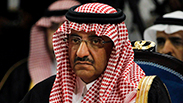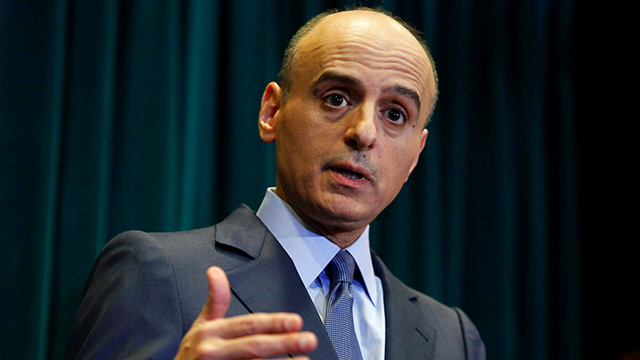
Panic on the streets of Riyadh
Analysis: The recent upheaval in the Saudi leadership is a sign of uncertainty - over Iran, the US and the Islamic terror groups.
The appointment of Adel Al-Jubeir as Saudi Arabia's new foreign minister was part of a huge shake-up that took place among the kingdom's political leadership this past week.
The protégé of two Saudi kings and senior ministers in Riyadh, Al-Jubeir, who miraculously escaped an attempt on his life in October 2011 while serving as his country's ambassador in Washington, is well known to Israeli officials from the days when he was a member of the Saudi delegation to the Madrid Peace Conference and attended the signing of the Oslo Accords on the White House lawns.
He's a discreet individual, and appears before the media only in keeping with directives from the king's palace; but his political and security positions are not foreign to Israel officials.
The upheaval in the kingdom occurred on Tuesday night, with the announcement on state television of a series of political appointments and dismissals, including the ousting of Prince Muqrin bin Abdulaziz, the half-brother of King Salman who served briefly, from January to April 2015, as the Saudi Crown Prince.
The new heir to the throne is Prince Muhammad bin Nayef, 55, the nephew of King Salman and the so-called "General of the war on terrorism." Bin Nayef's appointment is likely to be welcomed in Washington due to his close ties with senior US intelligence and Pentagon officials. It also points to the fact that even if King Salman plans to adopt a more aggressive stance towards Iran than his predecessor, King Abdullah, he has no intentions of undermining Saudi Arabia's relations with the United States, despite Washington's betrayal of the kingdom in favor of Tehran.
Another fascinating appointment is that of Prince Mohammad bin Salman, 30, to the post of Deputy Crown Prince. In recent weeks, Mohammad, who also serves as the Saudi defense minister and deputy prime minister, has been overseeing Operation Decisive Storm, the 10-country coalition's military assault on Houthi rebel bases and targets in Yemen.
Spurred on by the anger in the kingdom over the nuclear deal with Iran, the young defense minister has put on an impressive show of strength, expressed by the fact that Saudi Arabia did not bother to inform the US administration of its plans to carry out the air strikes in Yemen. The move represented a clear signal to Washington: Saudi Arabia can get by without you.
"Based on the dynamics in play in Saudi Arabia, I wouldn't rule out the possibility that the 'boy prince' (Mohammad's nickname in the Arab media) will be the next king," says an Israeli expert on Saudi affairs. "The longer King Salman lives, the easier it will be for him to skip over the official heir to the throne and pass on the baton to his favorite son."
The unsurprising dismissal
The most unsurprising dismissal was that of Prince Saud al-Faisal, who had served up until this past week as Saudi Arabia's foreign minister for no less than 40 years. In all likelihood, Al-Faisal, who has been suffering in recent years from Parkinson's disease, will always be remembered as "the longest-serving foreign minister in the world" and the man who in 2002 put the Arab Peace Initiative up for vote in the Arab League. He'll also be remembered for his son-in-law, Prince Sultan, the son of the king, who was the first-ever Arab astronaut and took a copy of the Koran with him into space.
In addition to the appointments and dismissals, the Saudi regime also decided to award financial bonuses to each and every one of the country's tens of thousands of soldiers, officers, police force members and defense and intelligence establishment personnel – with the purpose of buying their allegiance and obedience. The palace has pledged to give them all a 13th salary, tax free, including supplementary allowances and overtime pay.
"This is the regime's way of buying peace and quiet," the Israeli expert explains. "This may be the last financial bonus that these people get in the coming months due to the steep decline in oil prices on the global market – Saudi Arabia's principal source of income."
A kingdom in panic
According to the Israeli expert, the efforts to create a new regime order in Saudi Arabia are evidence of the kingdom's weakness.
"This is an attempt to signal to the world that the kingdom is in a panic," he says. "Saudi Arabia is panicked about Iran, about the Americans, and about the Islamic terror groups. In the framework of the changes in the palace, the king has selected people who will be able to deal with these three arenas."
The Islamic arena is particularly stormy. Just this week, the Saudi interior minister announced the arrest of 93 individuals suspected of being members of Islamic State. Sixty-one are locals who were recruited under the noses of the Saudi intelligence services. They are believed to have been sent out to perpetrate attacks on the royal palaces throughout the kingdom.
Meanwhile, the new Saudi foreign minister, Jubeir, will have a key role to play in his dealing with his Iranian counterpart, Javad Zarif – as part of the efforts to defuse US President Barack Obama's enthusiasm with respect to the nuclear deal with Iran and the lifting of the economic sanctions.
If the sanctions are lifted completely, the move could spell disaster for the Saudi economy and lead to political turmoil: Rising unemployment and increased frustration among the country's younger generation could lead to an "Arab Spring" in Saudi Arabia and undermine the stability of the Kingdom's institutions.
In two weeks, the leaders of the six Gulf States – Saudi Arabia, Bahrain, Qatar, Kuwait, the UAE and Oman – will fly to Washington as guests of President Obama. Their first stop will be the White House, and then they will move to Camp David the following day for a series of discussions. The weather should be pleasant. The mood at the talks is expected to be less so.
Obama has already said he will be doing some tough talking, and the president is expected to reprimand his guests with regard to human rights violations in their countries, the status of women, freedom of expression and democracy. The visitors, for their part, are readying to express their reservations vis-à-vis the rapprochement between Washington and Tehran.
"King Salman's health may prevent him from flying to the United States," says the Israeli expert. "If he doesn't go, he'll be represented by Foreign Minister Jubeir, his protégé. Jubeir is suited to the task: He's the one who whispered to Obama that he must reassure the Gulf States and convince them that the United States is not turning its back on them in favor of Iran."











